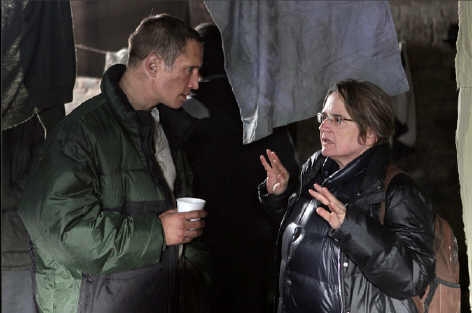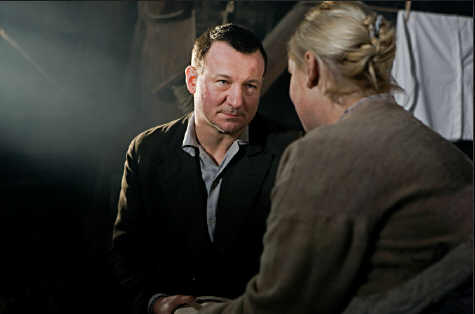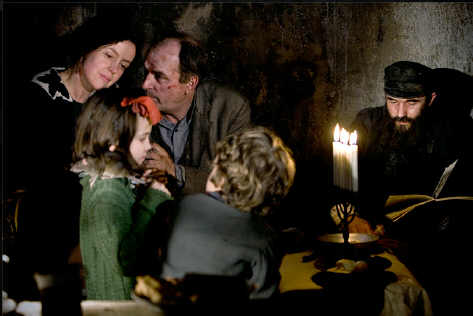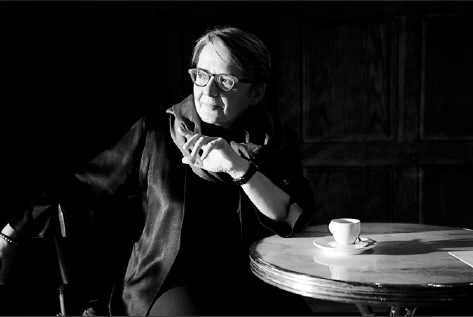Polish-born director Agnieszka Holland's movies and television shows have often changed the way we look at familiar events. Before 1990, most movies that dealt with World War II often presented the Nazis as monolithic monsters. While it was a lot of fun to see Indiana Jones beat up or outwit the Third Reich, it didn't tell us much about how the Germans came to have such a homicidal animosity toward Jews.
With her Oscar-nominated film Europa Europa, Holland universalized the Holocaust by presenting it through the eyes of Jewish teenager named Salomon Perel (Marco Hofschneider), who survived the war by passing for an ethnic German. In his world, the Germans are kind, loving people who also had murderous prejudices that they didn't seem to be aware of. As a result, they seem even scarier, and all of the genocide that has occurred after World War II sadly makes more sense.

In her other movies, Holland has demonstrated a way to make seemingly played out stories vibrant and engrossing. In her adaptation of Washington Square, she remains true to Henry James' vision but presents Catherine Sloper (Jennifer Jason Leigh) not as a victim of a charming schemer (Ben Chaplin) or a vindictive revenge seeker. Sloper does get hurt, but she grows wiser and stronger in a way that her shifty beau could never do.
With her latest film In Darkness, Holland returns to World War II (when her movies Angry Harvest and Europa Europa are set) and still manages to cover well-worn territory with fresh and even shocking perspectives. It's based on the dark, curious but inspiring story of sewer inspector Leopold Socha (Robert Wieckiewicz), who sheltered a handful of Jews in the sewers of Lvov, Poland until the Nazis fell.
While history now lists Socha as a hero, he was hardly virtuous. He augmented his meager wages by stealing and had to overlook his own preconceptions before saving the people he eventually protected.
While it might not be that much of a jolt to have a flawed hero like Oskar Schindler in Steven Spielberg's Schindler's List, In Darkness depicts the survivors of the sewers of Lvov in a bluntly honest and seemingly unflattering light. Ironically, by giving them real frailties Holland and Indian-born Canadian screenwriter David Shamoon manage to make them more sympathetic because they don't seem unbelievably virtuous.
Holland's unflinching depiction of life in the sewers is often harrowing. Viewers can practically smell the foul air the refugees breathed. Nonetheless, the film is strangely uplifting because a lost soul like Socha did the right thing when more seemingly righteous people did nothing or abetted the Nazis' atrocities.
The multilingual Holland (she estimates she's fluent in six languages) was speaking by phone from Los Angeles on a break from some of her other assignments. Early in her career, she was a screenwriter for fellow Polish filmmaker Andrzej Wajda (Danton, Korczak). Now a two-time Oscar nominee, Holland has helmed episodes of David Simon's acclaimed HBO dramas The Wire and Tremé.
Having made a long series of films that could be described as difficult, Holland says In Darkness was her most challenging effort. By pushing her viewers as much as she drives herself, it's no wonder In Darkness is Poland's official submission for this year's Best Foreign Language Film at the Academy Awards, which has resulted in her receiving her third nomination. The movie opens in New York and Los Angeles on Friday, February 10.
This is the third movie that you've made that's been set in World War II. Why do you think you think you keep coming back to it?
Well, in the first place, I think it's a pool of incredibly powerful stories.
In the second place, I think it's such an important point in the history of humanity unresolved. It means we don't know how it was possible, and we are not sure at all if it will not happen again. It is like this mythological reality where people are coming back over and over again because we have to ask the most important questions about who we are.
That certainly applies to the situation with Leopold Socha because to this day we can't figure out why he made the sacrifices he did. He died shortly after the war.
Right. It shows that God exists and that he plays fun and games with the people. He's certainly not rewarding them for their good deeds.
It was interesting that you cast Polish actor Robert Wieckiewicz as Socha. I had just seen him in Little Rose (Rózyczka), so I had no idea if he would do the right thing or not because he played sort of a villain in that film. There was more tension with him in the role than if you had chosen a more internationally famous actor.
It's exactly what we wanted. We wanted to build the tension over the whole story, this uncertainty over where he will go and what will happen with him. He's like a man walking on a wire, and he can slip on both sides of the wire at any moment.

He also may have given up something financially because even though the Jews in the film pay him to keep them safe, he could have potentially made more money betraying them to the Nazis or the Ukrainians.
Maybe yes. But you never know. It was several years ago. There were several movies about this period that weren't successful financially. What I think you have to do is be as honest with the subject as possible.
Was that one of the reasons you insisted on shooting in the original languages of the region, Polish, Ukrainian and Yiddish?
Right. It's like reading poetry in its native language. You are sure that nothing is lost in translation, especially in translations of the emotions and the expressions. I wanted this film to look like a documentary in some way, to be as real as possible.
When you translate it into the English language, you not only translate it into the English language, but you also have different expressions from the actors and different contexts. Everything becomes much more conventional and theatrical. It never has this feeling of authenticity, at least to me.
At the same time, this is kind of similar to your other work because with the HBO series Tremé and with In Darkness, you really stress atmosphere. New Orleans, the setting for Tremé, is a very distinctive city.
But imagine if Tremé was shot in German, for financial reasons, no? It is exactly the same to shoot New Orleans in English. It is travesty (to do otherwise). Some movies support it pretty well, and some movies don't.
Socha seems almost the opposite of Wolny, the Armin Mueller-Stahl character in Angry Harvest because Wolny starts off as seemingly good and sinks into some type of abyss, but with Socha, the first thing we see him doing is robbing somebody's house.
Yeah, but Mueller-Stahl in Angry Harvest was much more twisted and more moralistic. He wanted to be a good man; he was planning it. And finally the film showed how difficult it is.
With Socha, he doesn't want to be a good man. He doesn't think of it. His choices are purely instinctive, and it's like the germ of what's good in him is growing against his will. That is a different kind of character. He becomes the hero without even knowing it, without even being proud of it until the very last moment when he sees the people he'd been caring about for 15 months to go up and see the sun. And he suddenly sees them as "My Jews." In some ways, I have more fondness for Socha than I had for the Mueller-Stahl's character.
Was it difficult to find enough actors who were fluent enough in Yiddish to perform the scenes written in that language?
I found two actors who speak Yiddish, and I found two actors in important parts who had to learn the language. They learned it so well that the Yiddish speakers didn't realize they were not speakers. There was extensive language preparation because the German actors learned Polish, and Socha and his wife learned a special kind of Polish, the way of speaking in Lvov, which is in Ukraine today, which was something like Cockney. It's different than the accent that regular Poles have.
While you shot most of the sewer scenes in a set in Babelsberg, Germany, you still did some shooting and location work in real sewers in Lodz. Was it difficult to breathe down there?
It was really difficult. We shot 20 percent of it in real sewers in Lodz and Leipzig. And the rest we built on the stage. I think the production designer did a great job with that. All of the shoot was very difficult. It was also an excruciating winter. It was so cold. In the sewers, it actually wasn't so cold. In the sewers, the temperature is stable in the winter or in the summer. But it was stinky, and it was very difficult to breathe. I can't remember any other shoot that was so difficult like this one.
But in the same way, it was appropriate. Those people who went through this survived through much worse than we did.
Both Wolny and the characters in In Darkness have to be informed that Jesus was a Jew. Was it common for people in Europe not to know that?
Yes, especially in Poland. Polish Catholicism is very populist in some way. Till now, if you go to the countryside and you said to the peasants that Jesus was a Jew, they'd look at you like, "What? Jesus, maybe, but Holy Mary certainly wasn't Jewish!"
They are very uneducated, and the Catholic Church in Poland--Pope John Paul II was different, but most of the priests were quite anti-Semitic, so they didn't spoil their message with that information. They taught that the Jews crucified Jesus, but they forgot to add that Jesus was a Jew himself.
All of the characters in the film do some contemptible things, but you still feel a lot of sympathy for the people stuck in the sewers. For example, early in the film a Jew dumps his wife and his daughter for his mistress. I'd never seen that in a World War II movie before.
But the picture of the victims has been so idealized that they stopped being real people. Among the victims you had everybody. You had the villains, the innocent people, sweet people, unbearable people, hysterical people, selfish people and generous people. It was a combination of all the
complexity of human nature that was not any different than that of the rest of the population. It just happened to them, and it shows the absurdity of that. They are exactly like anybody else.
When I was talking with Krystyna Chiger, who is the last survivor and was a little girl -- Little Krysza in the movie (Milla Bankowicz) -- when she saw the movie, she said it was exactly like that.
I felt horrible about the fact that I laughed loudly at a scene where a little girl casually brushed off a rat that was crawling on her.
It shows that some people can adapt to any conditions, in some way. It showed this incredible strength of human nature, that you can lead an everyday life in the bottom of a hell, and still make love and raise children and pray and eat and laugh.

Even though the story it haunting, it was relatively unknown until David Shamoon decided to adapt an out-of-print book. How difficult was it to get a beginner's script to where it was a viable film?
He's very talented and extremely honest writer. It was the first script he's written that was produced. Before that he was working mostly in advertising. He read the story some place, and he read the book, and he became obsessed with it. He wrote the script on spec. No one paid him for that.
He bought the rights to be book (Sewers of Lvov: A Heroic Story of Survival by Robert
Marshall) himself.
After he contacted me through the producers of Julie Walking Home, I passed on it. I really liked it, but I didn't want to make another movie of this kind. Also I didn't want to make this movie in English.
He was very stubborn. He kept coming back to me, and finally I understood that this story called me. And we had a great collaboration and understanding once we worked together on the last two or three passes on the script. We were very respectful to each other in this process.
I think the script is quite wonderful. It gave me enough imagination to improvise a bit with the situations in the sewer, and it gave a lot of material to the actors who played the real people.
Visually, is there anything you did to make the viewer feel as if she or he has been stuck in a sewer for two and a half hours?
We were talking a lot with the cinematographer (Jolanta Dylewska) about how to make it really dark and at the same time to preserve enough of the light to let people follow and understand things with the story and the characters. Those were two of the biggest challenges. We are both very proud that we succeeded in doing that, and that it works. It wasn't obvious.
There was a big danger that we would be trapped by not being real enough or being too dark to really follow the story. Another thing was how to keep the tension even with a movie which is so claustrophobic and long.
With the screenings we've had with different festivals, it showed that they are very connected to the story. They can like a film of this length. They are really kept by the storytelling. They are really touched.
You have a lot of characters, and their motives change during the film. If you had made it shorter, it might not have been as involving.
I'm glad that you say that. We tried to shorten it, but every time we went under two hours and 20 minutes, it felt longer. Part of the reason it felt longer was because it was formal instead of expressive, and at this moment, you're disconnected with the story. It was actually quite an interesting experience.
With In Darkness, many of the Ukrainians were actually happy that Hitler had initially defeated Stalin. Could you explain that to those unfamiliar with the situation on the Eastern Front?
Ukrainians had been hoping for independence, and before the Second World War were under Soviet and a kind of Polish occupation. They developed strong nationalistic feelings and believed that the Germans would help them to achieve independence. They became allies of the Nazis. Anti-Semitism was very strong among Ukrainians. They were very brutal helpers of the Nazis in the Holocaust.
But of course, it's very complex because they've been underdogs themselves. The frustration and the lack of freedom created these kinds of nationalistic murderous instincts, which is very dangerous in Europe always.
For example, if the European Union falls apart, which is now possible, it can come back at any moment. Look at the Yugoslavian War. It's like there's this germ, this virus in the European system, which makes these kinds of things possible, even today.
In both The Third Miracle and Julie Walking Home, you make references to your own frustrations in understanding baseball. In some ways, it's surprising your films aren't more personal.
When I'm directing movies instead of television, I'm working on somebody's TV series. I'm trying to serve his or her vision and to preserve the logic of the style. When I'm doing my own movies, even if I'm doing something that is detached from my life experience, I always try to make it in the most personal way possible. It's not that I don't have the urge to tell. I need to have the urge to go into the process of the feature film.
Your next film is going to be about the Prague Spring. Is that correct?
I will be making a miniseries about the Prague Spring for European HBO in Prague. I will be shooting at the beginning of March.
In the World War II movies, you're recounting things that happened before you were born, but you were in Prague in 1968.
That was my youth. I feel very much connected with the story. It was wonderful that the script was written by a very talented young Czech. He's only 27. When I read the rough draft of the script, I was under the impression that he lived through this period, it was so accurate. He was born after. You don't always have to be the witness of something to really feel the truth of it. Between me and him, I think it's kind of the perfect combination, so I hope it will be good.

It reminds me of your collaboration with Wajda because he lived through World War II, but you were born afterward.
With the Second World War, I was growing up with those stories. Those stories were my cradle stories, you know. I was growing up in a city where there were so many signs of the war. Warsaw was 90 percent destroyed. Even when I was a kid in the 60s, it was in ruins. The ruins have been my playground. It certainly shaped my imagination and my sensitivity. Even if I was born afterward, the impression of this war was part of my system.
All images © 2012 Sony Pictures Classics, used by permission.
